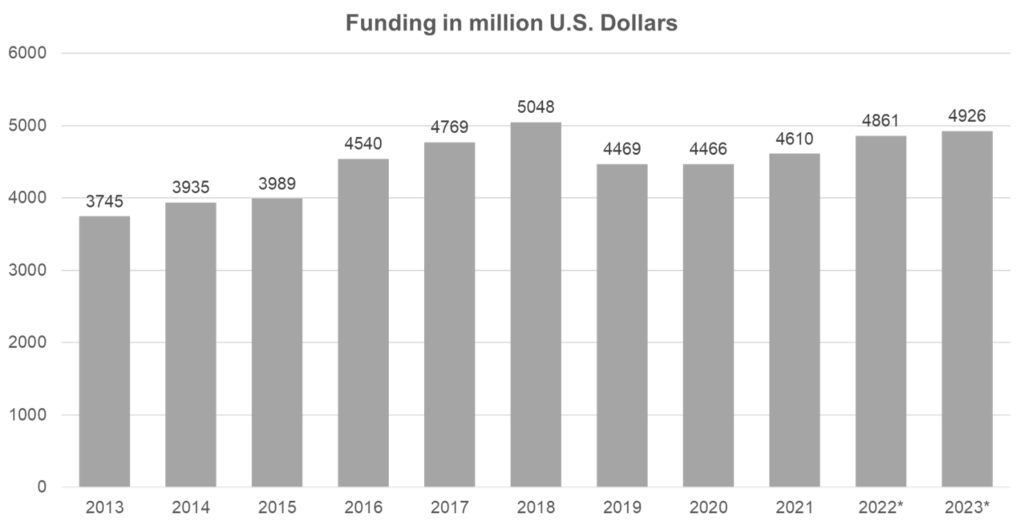Femtech: Changing Dynamics of Women’s Health Industry
As the saying goes, a woman’s health is synonymous with the family. Men may be the patriarch, but the matriarch runs the world in real terms. The womb of a mother is where life begins. Thus, their health becomes imperative. Interestingly, the Kahun Gynaecological Papyrus, dating back to 1800 BCE, also discusses female health. It includes contraception, pregnancy, and conception. In today’s day and age, along with growing technology, the term Femtech is emerging swiftly in medical corridors. It is offering new dimensions and aid to female health and women’s health industry.
The term surfaced in 2016 when Ida Tin, the founder of Clue, used it. She noted the huge potential of technology in female healthcare. She realized that male-dominated tech entrepreneurs are taking a backseat while investing in tech related to women’s health. Moreover, the MeToo movement accelerated the phenomenon, and Femtech became mainstream with gender equality in the sector. Given the impact, the femtech market size is expanding
What Is Femtech?
Femtech is a broad term that encompasses female health and addresses it through technology. It includes reproductive health, maternal health, sexual health, menopause, general health, and menstrual health, which are treated through products, wearables, diagnostic tools, and software. Moreover, it’s not limited to that but also takes into account pregnancy monitoring, pelvic care, cervical cancer, mental health, general health & wellness, and breast cancer.
Furthermore, it refers to products that affect women’s health overall and help elevate their lives and lifestyles positively. Thus, it is also giving rise to femtech startups. Hence, several femtech jobs are being created.
Market To Witness Tremendous Growth
The growing demand for tech in women’s health has kicked off the estimation that the global market is set to witness a mammoth investment in the sector. As per estimates, by 2030, the Femtech market valuation will peak at USD 53 billion globally. The revenue of the market for 2023 has totaled USD 1.2 billion. It is expected to hike at CAGR 15.2 percent and reach USD 5 billion by 2033.

Figure: Total Women’s Health Funding by the National Institutes for Health (NIH) from FY 2013 to FY 2023
Femtech Catering Necessity
Women’s health is navigating toward technology innovations, empowering females with fitness. Mobile applications and operative and diagnostic tools have come into development, acknowledging ailments and helping them.
Segmented by application, the Femtech market encompasses a spectrum of domains. It includes reproductive health, pelvic and uterine care, pregnancy and nursing care, and general wellness, among other facets. Women worldwide encounter challenges in conceiving. Moreover, It is worth noting that breast cancer stands as the foremost prevalent malignancy. Furthermore, chronic diseases often manifest with greater severity in the female population than their male counterparts. Hence, Femtech applications catering to the fundamental health requirements of women are projected to ascend prominently.
Regarding solutions, the Femtech market is divided into diagnostics, digital health, and therapeutics. Though women’s health is a relatively nascent and evolving field, remarkable progress is being made to introduce more comfortable screening procedures and foster a comprehensive comprehension of women’s health. The prominence of digital health solutions and portable diagnostic tools that offer convenience and practicality shall assume a prominent role.
In recent years, the utilization of mobile apps for fertility tracking and other related purposes has experienced a remarkable surge. The primary attribution is there to expanding the market reach of smartphones.
- Availability Of Different Applications:-
- Care for uterine and pelvic
- Menstrual health
- Pelvic wellness
- Uterine health
- Mobile Application for reproductive health
- Tracking and monitoring at a convenience
- Period tracking
- Nursing care and pregnancy
- Breastfeeding
- Prenatal care
- Postnatal care
- Catering to overall wellness
- Sexual
- Mental
- Acute diseases
How is Femtech Helpful?
Enhances Healthcare Access: Virtual clinics, direct-to-consumer prescription delivery services, and innovative physical clinics offer women a more convenient and user-friendly approach to accessing healthcare.
Empowers Self-care: Femtech companies provide wearable devices, healthcare trackers, and at-home diagnostics that enable women to control their health and effectively manage their health-related data.
Tackles Sensitive Topics: Femtech companies courageously address once-taboo subjects, including sexual health, menopause, and menstrual health, promoting open discussions and breaking down stigmas associated with these issues.
Delivers Culturally Sensitive and Personalized Care: Femtech companies tailor their products and services to cater to marginalized groups. It includes Black women, women in low- and middle-income countries, and LGBTQ populations. That ensures their unique needs and circumstances are acknowledged and addressed.
A Better Understanding of Women’s Needs: Since most Femintech companies are established and led by women, they possess a deeper understanding of women’s needs and challenges. Moreover, they can effectively cater to diverse groups and individuals.
Reduces Gender Inequality in the Tech Industry: Femtech not only liberates women from gender stereotypes but also promotes and recognizes talent. Moreover, it provides the expertise of female technicians and scientists. It provides them with more employment opportunities, contributing to a more equitable tech landscape.
Challenges To Companies
Regulatory Hurdles: Regulatory challenges pose another significant obstacle for Femtech companies. As Femtech products and services become more advanced, they encounter intricate regulatory requirements. For instance, Femtech companies developing medical devices must obtain regulatory approval from institutions like the Food and Drug Administration (FDA). This regulatory process can be time-consuming and costly, impeding the speed of innovation and product launch for Femtech companies.
Limited Data: Accessing relevant and reliable data presents challenges for Femtech companies aiming to enhance product development and improve patient outcomes. Women’s health data often suffer from incompleteness and inaccuracies, while the lack of standardization in electronic health records complicates data gathering and analysis on a large scale. Limited access to comprehensive data can hinder the creation of effective products that truly address women’s diverse needs.
Stigmatization in Public: The persistent stigma surrounding women’s health and wellness issues can impede the adoption and growth of Femtech products and services. Historically, women’s health topics have been considered taboo and not openly discussed. This poses marketing challenges for Femtech companies among older generations, who may be less receptive to conversations about these issues. Overcoming this stigma requires efforts to dismantle societal taboos surrounding women’s health and raise awareness about the significance of Femtech products.
Additional Challenges
Lack of Funding: A significant obstacle Femtech companies face is the gender disparity in venture capital funding. Despite the promising growth potential of the Femtech industry, female-led companies receive considerably less funding than their male-led counterparts. Recent data from PitchBook reveals that only 2.1% of venture capital funding was allocated to female-led startups in 2022. This funding discrepancy severely hampers the scalability and innovation of Femtech companies, limiting their ability to develop cutting-edge products and services.
Diversity Challenges: The lack of diversity within the Femtech industry presents another challenge. Like the broader technology sector, Femtech faces criticism for its insufficient representation of women in leadership and technical roles. This lack of diversity can result in blind spots during product development and marketing, ultimately constraining the full potential of Femtech offerings.
Cybersecurity Concerns: Femtech companies must navigate the complex landscape of cybersecurity. Many Femtech products collect sensitive health data, including information related to menstrual cycles, fertility, and sexual activity. This personal data becomes an attractive target for hackers, increasing the risk of data breaches. Femtech companies must invest in robust data security measures and encryption protocols to address these privacy concerns and safeguard their customers’ sensitive information.
Advantages Offered By Best Femtech Companies
Some of the top femtech companies are offering unprecedented results.
- Facilitating Self-care: Distinguished Femtech enterprises such as Bloomlife and Modern Fertility extend wearable trackers and at-home diagnostics. Therefore, empowering women to assert dominion over their well-being and adroitly manage health-related data.
- Propelling Medical Diagnoses: Vanguard clinical diagnostics establishments like DotLab and Sera Prognostics spearhead advancements in addressing critical medical exigencies such as endometriosis and preterm birth.
- Tailoring Care for Diverse Populations: Bespoke solutions are burgeoning to cater to distinct subpopulations, exemplified by Health in Her HUE, which serves the needs of Black women; FOLX Health, which extends support to LGBTQ+ communities; and Kasha, which affords culturally sensitive and personalized care to women in low—to middle-income countries.
- Augmenting Care Delivery: Groundbreaking brick-and-mortar clinics such as Kindbody and avant-garde direct-to-consumer prescription delivery services like The Pill Club transform the landscape of healthcare provision, furnishing women with unparalleled convenience and consumer-centric options for essential care.
- Promoting Well-being: Femtech solutions are designed to address a wide range of health conditions that affect women uniquely or disproportionately. These innovative offerings encompass tools for tracking and managing conditions like osteoporosis and cardiovascular disease alongside telemedicine services that facilitate consultations with healthcare providers.
- Incorporations of Technologies in Femtech: Femtech (Female Technology) encompasses a range of technological advancements that aim to enhance women’s health and overall well-being. This encompassing term commonly refers to a wide array of offerings, including products, services, applications, and software solutions, medical devices, telehealth capabilities, wearable technologies, hardware innovations, therapeutic medications, nutritional supplements, digital platforms, and consumer goods, all meticulously designed to promote and elevate women’s health.
- Menstrual and Fertility Trackers: The application aims to help women monitor their menstrual cycles and help them determine their potential for bearing children. Thus, it helps them take informed action regarding pregnancy. It also helps females keep track of their PMS symptoms and any behavioral changes in a calendar month.
- Pregnancy Trackers: Pregnancy is important in a woman’s life. Some mobile applications are tailored to assist mothers in monitoring their health and keeping them informed of physical changes during the time.
- Integration of Artificial Intelligence: AI-enabled applications can help physicians evaluate data and reports provided by patients. They also assist nurses and doctors through predictive analysis.
- Report Sharing: Femtech can help share information, reports, and diagnoses with specific doctors.
- Digital Therapeutics: These therapeutics are software assisting in managing and treating medical conditions for females.
- Bone Health Device:- This device boosts women’s bone strength through vibration to the spine and hips, especially for those who lose bone mass in old age.
- Enabling Web-based Counseling: Digital consultation is one of the biggest boons of Femtech for females who cannot move and require medical guidance from specialists. So, for any queries, users can contact doctors for digital consultation using their phones and computers.
Concerning Ailments To Women and Innovations In Femtech
Endometriosis:
Endometriosis, affecting around 10% of women and girls in their reproductive years globally, is a chronic condition accompanied by severe pain during menstruation, sexual intercourse, bowel movements, and urination. Chronic pelvic discomfort, abdominal bloating, nausea, fatigue, and potential emotional impacts like depression, anxiety, and infertility further exacerbate the condition. However, despite its prevalence, there is currently no known cure for endometriosis, with treatment primarily focused on symptom management. However, access to early diagnosis and effective treatment is essential. Thus, Femtech steps in early diagnosis to relieve patients with humongous discomfort; otherwise, it can take almost 10 long years.
PCOS:
Polycystic ovary syndrome (PCOS), a prevalent condition affecting over 116 million women worldwide, instills a sense of disarray within their personal identities. However, the realm of Femtech has emerged as a beacon of hope, ushering in remarkable progress. It empowers women through educational resources, virtual consultations, and tailored treatment alternatives. Notably, innovative applications like Pollie serve as a catalyst, bestowing women the much-needed support and guidance to navigate the intricate landscape of PCOS with greater confidence and understanding.
Menopause Health:
In the ever-evolving healthcare landscape, a wave of pioneering solutions has emerged, driven by a steadfast commitment to enhancing the well-being of women traversing the transformative journey of menopause. The Embr Wave, a cutting-edge bracelet, utilizes patented technology to cool the inner wrist on demand. Designed to alleviate hot flushes experienced during menopause, it offers a refreshing solution alongside traditional hormone replacement therapies. It delivers enhanced cooling effects and prevents adaptive skin desensitization by providing varying thermal stimulation. Likewise, there are other innovations.
Birth Control:
In the realm of digital healthcare, many esteemed apps and websites have emerged, bestowing upon women the invaluable convenience of doorstep delivery for birth control. Among these remarkable platforms, Carafem stands at the forefront. It offers a comprehensive suite of services tailored to support women in navigating the complexities of abortions. At the heart of Carafem’s approach lies an ingenious 24/7 virtual care assistant named Cara, infused with the power of artificial intelligence. The chatbot diligently guides women through the intricacies of self-administering abortion pills in the comfort of their own homes.
Conclusion
As reproductive surveillance has endured throughout history, its intricacy, efficacy, and pervasiveness have been amplified by the advent of digital technologies. However, it is crucial to acknowledge that the illusion of control and access to personal body information created by these technologies has also led to extensive data collection and reproductive surveillance for corporate benefit and reproductive control. Hence, relying on representation is unlikely to tackle the broader gendered structural framework within the health realm. Instead, the solution must delve deeper, addressing the entrenchment of a neoliberal gendered representation and advocating for enacting progressive laws and policies that depart from this traditional paradigm. Also, a femtech product can resolve issues pertaining to the aforementioned things, and Stellarix can help define that.
Let's Take the Conversation Forward
Reach out to Stellarix experts for tailored solutions to streamline your operations and achieve
measurable business excellence.



